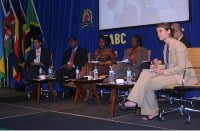Two executives from one of the largest renewable energy companies operating in South Asia explain how their Kenyan roots have impacted their moves into the RE sector and their hope for Africa.
Astonfield, recently awarded the Prestigious Global Green Award at the World Trade Week NYC, works to deliver affordable clean energy solutions tailored to each community in emerging markets throughout the world. The company also houses two Kenyan natives: Ameet Shah, co-founder and co-chairman of Astonfield Renewable Resources Ltd. and COO Aparna Doshi.
Doshi told Alternative Energy Africa that she got involved in this sector based upon her roots in Kenya and seeing the impact of social development on communities. “[I] consider my efforts in [the renewable energy sector] as a roadmap to make a difference to the very issues that are dear to me.” She continued, “Renewable energy has the ability to have a transformational impact on the developing world.”
Since Astonfield first began, it has developed a RE portfolio of nearly 1,000 MW of which 45 MW of solar photovoltaic is about to begin under India’s National Solar Mission and State solar programs. The company will also add a further 100 MW of biomass projects which are under development with its partner and fellow RE giant Areva.
The company’s ventures into India are notable as the successful applications could be applied to projects in Africa. The executives said Africa was very similar to India including power challenges like grid shortages, energy security concerns, and the “complete lack of power in most rural areas.”
Therefore, Astonfield has set its sights on venturing into Africa – East Africa to be exact. The executives said that building out business in India will lead to a broader emerging markets strategy. “We are able to leverage our Indian volumes to secure systems components at prices which allow RE to be affordable for the first time in markets such as East Africa.”
There are two major obstacles to the development of successful RE industries in Africa, according to the executives. “To secure funding, project developers must sign power purchase agreements (PPAs) backed by strong government policy and regulatory frameworks,” noted the executives.
Kenya is making great strides in order to address RE regulation. In 2006, the Kenyan Parliament began hearings held in connection with the UN Climate Conference with later meetings resulting in the introduction of a private members bill to Parliament in 2008. As a result, the East African country established a feed-in tariff (FIT) policy.
The government released its first revisions in January 2010 detailing that two PPAs had been signed while negotiations were ongoing for the establishment of a PPA with another four developers. And an additional 12 projects are on the verge of completing feasibility studies. However, developers are complaining that they are unable to undertake projects at the set tariff rates as a result of the increase in generating costs, equipment, and financing (Please see Alternative Energy Africa’s special four-part series detailing Kenya’s FIT).
Shah and Doshi said that in order to ensure that electricity generated from RE is affordable to African markets, developers must source low-cost system components. “Astonfield is leveraging its 1,000 MW pipeline in India to secure top tier RE systems at the most competitive prices for its African projects and hence improve the affordability of electricity to these countries,” they said. “Our biggest challenge is to inspire governments to create robust regulatory frameworks to support the long-term investments required for this sector to flourish and make a tangible difference to their economies.”
Doshi added, “My future hopes for the renewable energy sector in Africa are focused on the implementation of viable policy and regulatory frameworks to support commercially viable clean energy programs. With such government support, we can stop hoping and start producing clean, locally-sourced electricity.”
While Astonfield recognizes that there isn’t just one solution that will cure the complex energy needs for Africa, its strategy is to deploy proven technology that fit the individual needs of each community. “We will bring a suite of clean energy solutions including solar, biomass, and waste-to-energy, so we can then deploy the technologies that make the most sense for the individual community,” they said.
Shah said, “Being born in Kenya, I had always hoped to come back and make a meaningful contribution to Africa. As a company, we can now capitalize on all our experiences in developing RE projects around the world to deliver a better, cleaner future to Africa. I firmly believe that RE is the key to sustainable development in Africa.”
For more information on Astonfield’s endeavors in the RE sector, please visit its website at www.astonfield.com.
Subscribe to Alternative Energy

